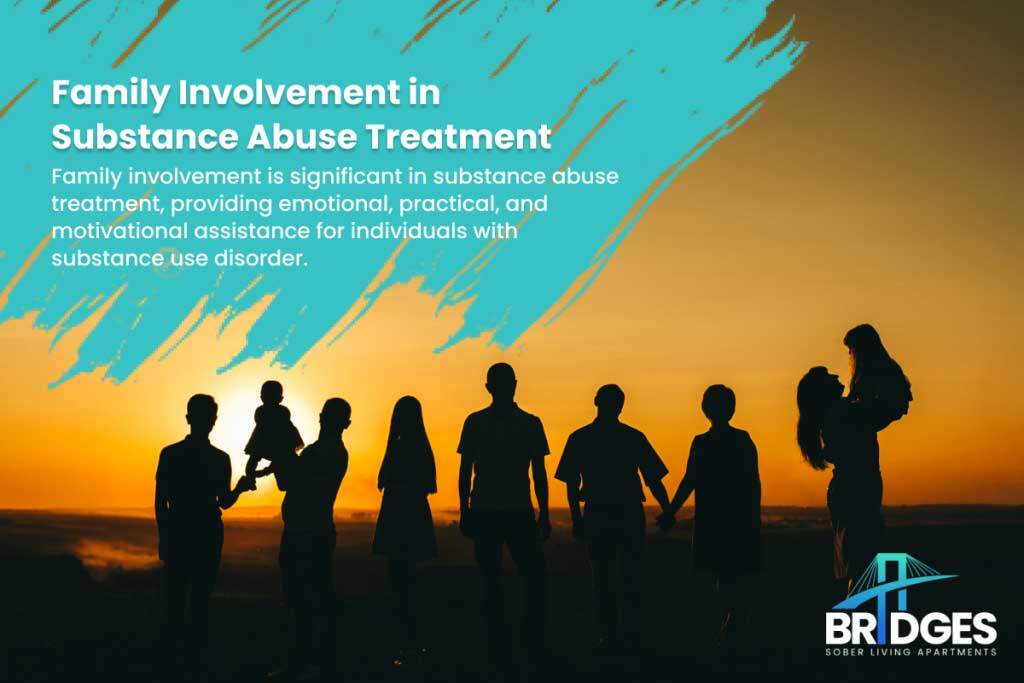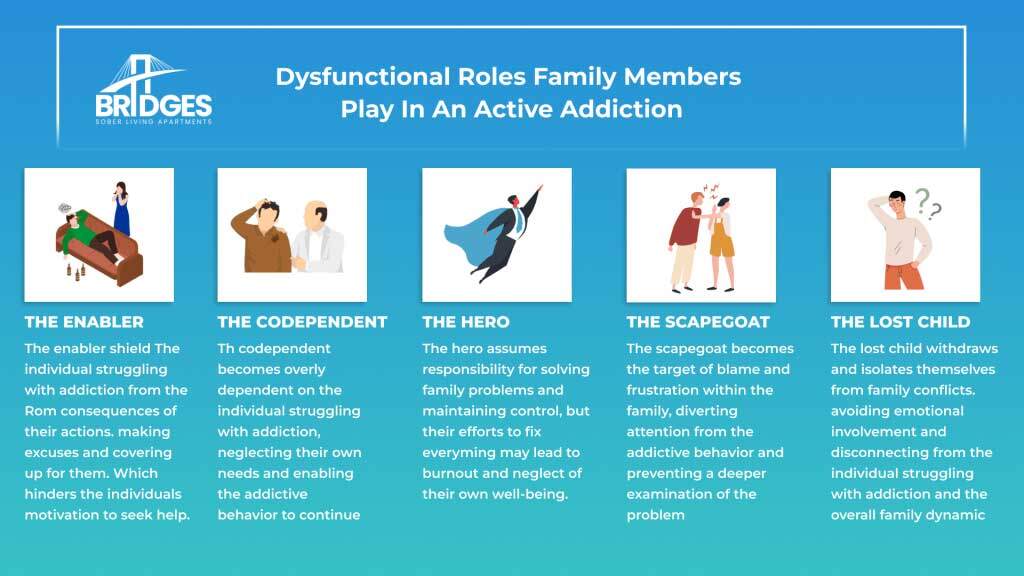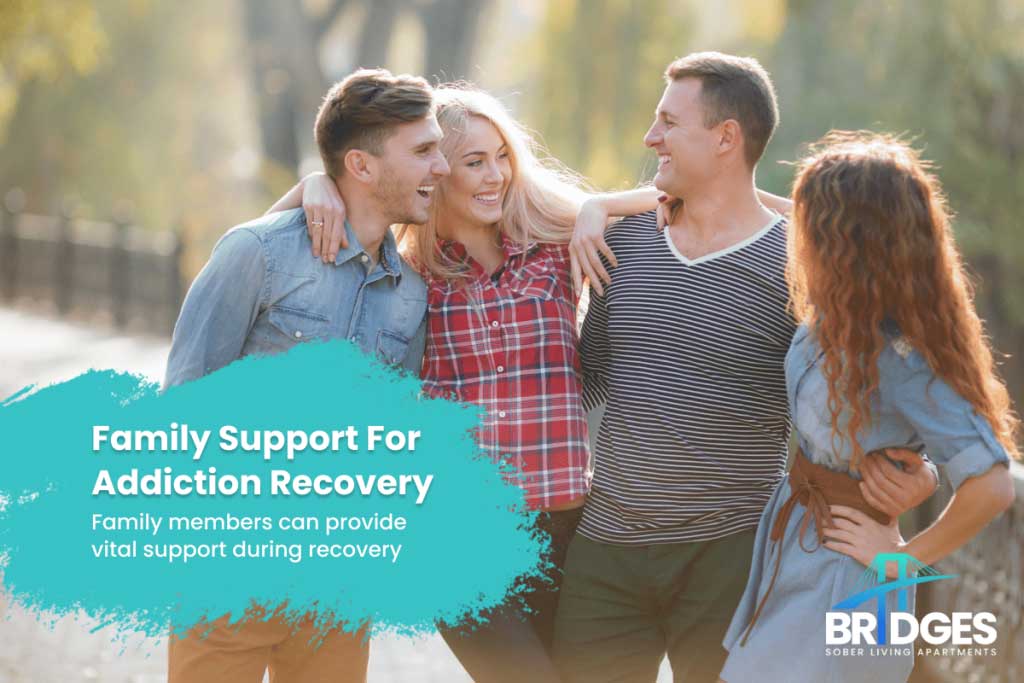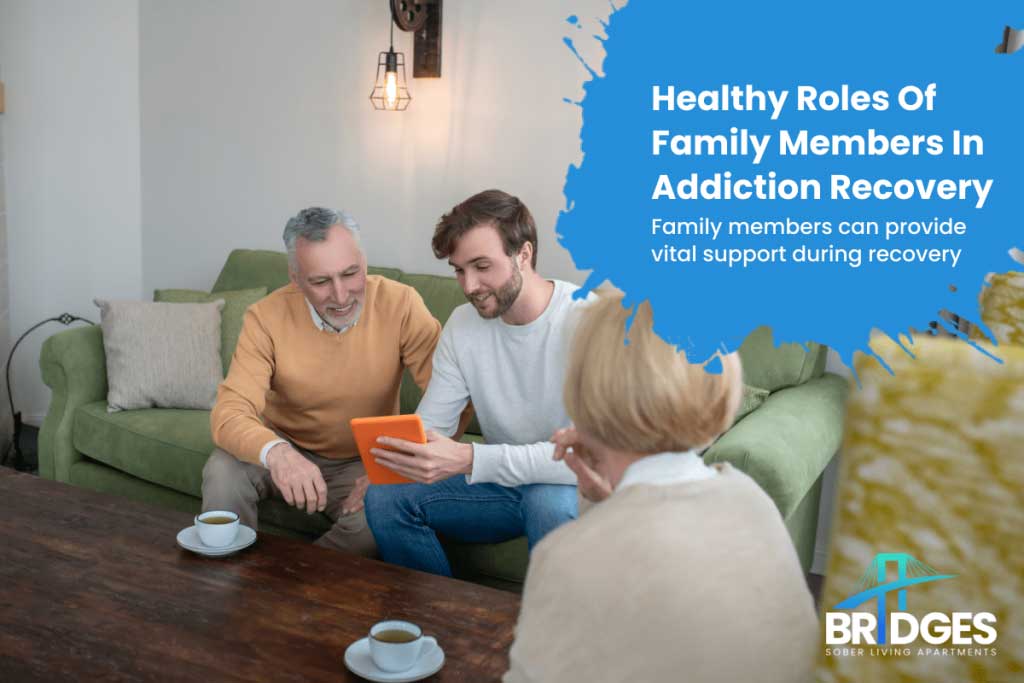Family involvement is significant in substance abuse treatment, providing emotional, practical, and motivational assistance for individuals with substance use disorder.
Emotionally, family members offer understanding, alleviating feelings of isolation and shame. Practically, they aid in accessing mental health services and treatment programs while addressing financial difficulties.
Moreover, their unwavering comfort and encouragement powerfully motivate the individual’s recovery. Together, the family network empowers the individual to overcome addiction’s challenges.

According to a scoping review protocol, involving families in addiction treatment can reduce harm and improve treatment entry, completion, and health outcomes for individuals dealing with addiction. That being said, family involvement promotes overall well-being among individuals struggling with substance abuse and family members.
Family education is necessary for recovery, especially for parents and children affected by substance abuse. By learning about substance abuse, its effects, and the healing process, family members can better support their loved one’s journey to sobriety.
Education equips them with essential coping skills to recognize enabling behaviors and codependency patterns. This involvement empowers the family members to contribute to a more supportive family unit.
Family education in recovery offers many benefits that positively impact both the individual in recovery and their family:
When a family member is dealing with substance misuse, various dysfunctional roles may emerge within the family dynamic, such as the enabler, the codependent, the hero, the scapegoat, or the lost child.

Substance abuse develops complex dynamics within the family, and seeking help from a qualified treatment provider or participating in 12-step groups offers insights and coping strategies.
By taking proactive steps to address these dysfunctional roles, you not only aid a family member’s recovery but also protect your own health.
Family members can provide vital support during recovery in the following ways:
Creating a Safe and Supportive Environment– Offering understanding and non-judgmental support creates a safe space for the individual to share their struggles and progress openly.
Participating in Family Therapy or Counseling– Attending therapy together helps address underlying family issues and fosters healthier communication and dynamics.
Attending Support Group Meetings Together– Joining support groups as a family provides valuable insights and a sense of community while learning coping strategies from others facing similar challenges.
Offering Encouragement and Understanding– Positive reinforcement and empathy motivate the individual to stay committed to their recovery.
Establishing Boundaries– Setting healthy boundaries is essential for the individual in recovery and their family. Clear boundaries help manage expectations and promote a balanced family dynamic, protecting everyone’s well-being.
Practicing Self-Care– Supporting a loved one in recovery can be emotionally taxing. Encouraging self-care and seeking support for themselves, such as individual counseling or support groups for families, ensures that the family is also cared for during this challenging time.

Offering help in person demonstrates your dedication to your loved one’s well-being, making a significant difference in their journey to sobriety.
There are practical ways you can assist a loved one in their recovery from drug or alcohol use disorder. These include assisting with logistics such as providing transportation to therapy sessions, ensuring a safe and sober living environment, and helping manage daily responsibilities.
Encouraging healthy habits like exercise, nutrition, and sufficient rest can also contribute to the individual’s overall health.
Moreover, fostering a sense of belonging and connection by participating in family activities and spending quality time together can provide invaluable encouragement. Finally, celebrating milestones and achievements, no matter how small reinforces progress and commitment to sobriety.

The Listener– Be there for your loved one struggling with addiction. Listen to their thoughts, feelings, and experiences without judgment, providing them with a safe space to express themselves.
The Educator– Learn about addiction, its effects, and available treatment options. Be informed and help your loved one access the right resources for their recovery journey.
The Support System– Offer unwavering emotional support and encouragement. Show them that you believe in their ability to overcome addiction.
The Active Participant– Engage in family therapy sessions and support groups. Actively contribute to discussions, learn new coping skills, and work on building healthier relationships.
The Boundary Setter– Establish healthy boundaries to protect both yourself and your loved one. Avoid enabling behaviors and codependent patterns that might hinder their progress.
The Alcohol Abuse Awareness Advocate– If alcohol abuse is part of the addiction, create a substance-free environment at home and promote responsible alcohol use within the family.
The Co-Occurring Disorders Companion– Understand the connection between addiction and mental health. Support your loved one in seeking treatment for any co-existing mental health issues.
The Treatment Compliance Encourager– Motivate your loved one to adhere to their treatment plan, attend therapy sessions, and take prescribed medications as needed.
The Relapse Prevention Ally– Educate yourself about common relapse triggers and warning signs. Offer ongoing support and intervene if necessary to prevent relapse.
The Healthy Communicator– Foster open and honest communication within the family. Encourage discussions about struggles, progress, and aspirations for the future.
The Post-Treatment Transition Guide– Be there during the transition from treatment to daily life. Provide stability, support, and assistance in finding employment or educational opportunities.
Support groups offer invaluable benefits to family members impacted by substance abuse. Popular groups like Al-Anon, Nar-Anon, and Families Anonymous provide a safe and supportive community where both you and other family members can share experiences and emotions without judgment. These groups offer education about addiction, its effects, and coping strategies to help individuals suffering from substance misuse and their families overcome the challenges of recovery together.
Moreover, family therapy or counseling services within addiction treatment programs play a key role in recovery. These services address the entire family system, helping all family members understand the impact of substance abuse on the individual and themselves. Through therapy, families learn healthier ways to communicate, set healthy boundaries, and provide assistance without enabling harmful behaviors.
Discover the transformative possibilities of sober living and regain control of your path to recovery. At Bridges Sober Living Apartments, we provide a caring and well-structured environment to foster healing and establish lasting sobriety. Embrace the opportunity to bond with others on the same journey, access vital assistance, and build the foundation for a rewarding, substance-free life. For more information on our sober living home, reach out to us through our contact page or call 310-953-4075.
Kourgiantakis, T., & Ashcroft, R. (2018). Family-focused practices in addictions: a scoping review protocol. BMJ open, 8(1), e019433. https://doi.org/10.1136/bmjopen-2017-019433
Kelly, S. M., O’Grady, K. E., Schwartz, R. P., Peterson, J. A., Wilson, M. E., & Brown, B. S. (2010). The relationship of social support to treatment entry and engagement: the Community Assessment Inventory. Substance abuse, 31(1), 43–52. https://doi.org/10.1080/08897070903442640